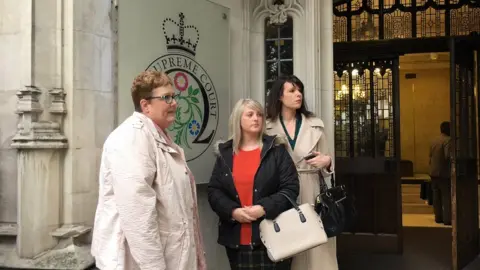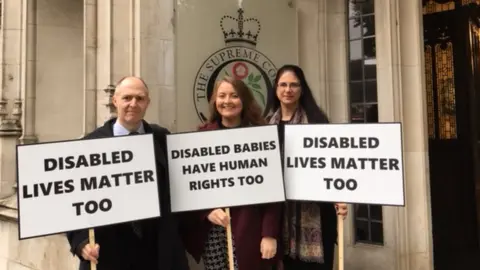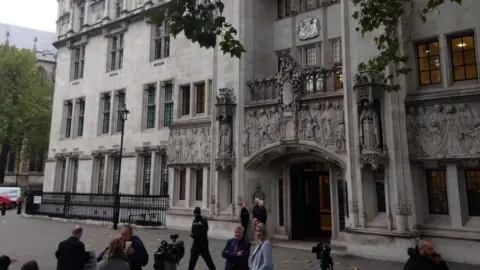NI abortion law 'degrades women,' Supreme Court is told
 KatarzynaBialasiewicz
KatarzynaBialasiewiczWomen and girls are subject to "inhuman and degrading" treatment due to Northern Ireland's strict abortion law, the UK's highest court has been told.
It heard women experience "physical and mental torture" as they cannot have legal abortions in cases of rape, incest or fatal foetal abnormality.
The landmark appeal at the Supreme Court argues the law is incompatible with international human rights.
Anti-abortion campaigners called the case an "attack" on the unborn child.
The appeal has been brought by the Northern Ireland Human Rights Commission (NIHRC), which argues the current law in Northern Ireland breaches the European Convention on Human Rights.
Its barrister told the Supreme Court the ban on abortion discriminates against woman and girls on the grounds of gender and amounted to an "unjustified" breach of their personal right to autonomy.
She also read evidence from three women who were refused abortions in Northern Ireland, despite being told by doctors that their unborn children had fatal foetal abnormalities and would die before, during or shortly after birth.
The barrister described it as "trauma and humiliation" and claimed the women were forced to go through "physical and mental torture".
She added: "Northern Ireland's political crisis will not, in the foreseeable future, vindicate these girls and women."
'Nightmare'
The personal experience of Northern Ireland woman, Sarah Ewart, was central to placing Northern Ireland's abortion laws before the courts.
In 2013, she travelled to England for a termination after doctors said her unborn child had no prospect of surviving outside the womb.

Speaking outside the court on Tuesday, she said: "I am an ordinary woman who suffered a very personal tragedy which the law in Northern Ireland turned into a legal nightmare.
"My much-loved baby was given a diagnosis of a fatal abnormality where the skull does not develop and there is no skull."
She added: "I should have been given the option to terminate my pregnancy in Northern Ireland and bring an end to my suffering with the medical professionals I knew and my family around me.
"The failure of our politicians to legislate for change has left me with no choice but to turn to the courts to have my rights upheld."
Anti-abortion campaigners are holding a protest outside the court.
They have argued that doctors cannot accurately predict if, or when, an unborn child will die.

Liam Gibson, from the Society for the Protection of Unborn Children, told the BBC the Supreme Court hearing is "an attack on the life of unborn children, particularly the disabled".
Britain's 1967 Abortion Act, which provided a legal defence for carrying out abortions out in England, Scotland and Wales, was never extended to Northern Ireland, where abortion laws remain much stricter than the rest of the UK.
'Life imprisonment'
Abortion law in Northern Ireland is based on the Offences against the Person Act 1861, which made it an offence to terminate a pregnancy.
In 1945, an exception was added to allow abortion in order to preserve the life of the mother.
Abortions are also allowed if continuing with the pregnancy will result in other serious physical or mental health effects.
The punishment for breaking the law remains life imprisonment.

Timeline of NI abortion law challenges
- 30 November 2015: A High Court judge in Northern Ireland rules Northern Ireland's law breached the European Convention on Human Rights in cases of fatal foetal abnormality or sexual crime
- 11 February 2016: Members of the Northern Ireland Assembly vote against legalising abortion in cases of fatal foetal abnormality (by 59 votes to 40) and cases of sexual crime (by 64 votes to 30)
- 14 June 2017: Supreme Court rejects an appeal by an anonymous mother and daughter that NI women should be able to access free NHS abortions in England.
- 29 June 2017: Northern Ireland's Department of Justice (DoJ) and Attorney General successfully appeal against 2015 High Court human rights ruling, prompting the NIHRC to go to the Supreme Court
- 29 June 2017: The government announces women from Northern Ireland will be entitled to free NHS abortions in England, after a Labour-led campaign

Both the Attorney General and the DoJ will be responding to this week's Supreme Court hearing.
A coalition of healthcare charities and women's rights organisations are also intervening in the case.
This is a significant step in Northern Ireland's abortion law story, as the Supreme Court in London is the final court of appeal for all civil and criminal cases.

In June, the government announced that women from Northern Ireland would be able to access free abortions in England, but campaigners pointed out that the procedure was not only expense.
On Monday, the Minister for Women and Equalities, Justine Greening, announced a plan to cover travel costs to England in some "hardship cases".
It means women from Northern Ireland, whose income is less than approximately £15,300 per year, will be eligible to state support to pay for travel and accommodation if they choose to have an abortion in England.
The Supreme Court hearing is expected to last about three days.
